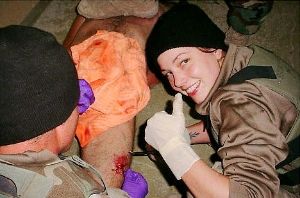 Though tempting to believe American military power turned the tide in Iraq when President Bush sent in additional troops and that today that same resolve can save an illegitimate government, neither is true. We learned this lesson in Viet Nam. The military answer is simple. Obama’s political choice is not.
Though tempting to believe American military power turned the tide in Iraq when President Bush sent in additional troops and that today that same resolve can save an illegitimate government, neither is true. We learned this lesson in Viet Nam. The military answer is simple. Obama’s political choice is not.
Two important forces converged at the moment George Bush decided to throw more troops into the fray against the growing Iraqi insurgency. Neither were military. Neither were affirmations of support. It was the story of choosing the lesser evil as perceived by the Iraqi people.
American military forces committed atrocities that alienated the most important factors in any insurgency: the hearts and minds of the populace. It is a convenient fact that the American people were never allowed to grasp the full impact of Abu Ghraib and other moral lapses committed by our troops and their leadership. That failed leadership extends, by the way, all the way to Washington D.C. and is not limited to the principal resident of the White House. But as my Australian officer classmate, Mal Reardon, liked to aver, “Winners are grinners.”
If you love America, you should read this even though it won’t be pleasant. But for you super-patriots who love a place that doesn’t exist, beware of cognitive dissonance.
In the fall of 2003 the rules of engagement for the invasion of Iraq included sweeping suspected regime sympathizers into custody. The term sympathizer was applied broadly and interpreted by at least one unit to include reporters for Arab news media. As told to the British Broadcasting Corporation (BBC) in Iraq After The Invasion, one reporter from al Jazeera was taken into custody when he responded to an explosion of a mini-bus in Diyala province north of Baghdad. He had been detained before and thought it would be the same questions and same result: release after an hour or two. This time was different; he was taken to a prison that had been infamous as a site of torture and execution under the Hussein regime: Abu Ghraib. We had taken part of the facility and used it as a military prison.
As described by a teacher who was detained in October 2003 because he had spoken to international journalists, the in-processing went something like this: new detainees were brought to an entry area where information about their identity was collected; then they were sat in a line and they were not allowed to stand up afterwards; from this point forward they were required to crawl on their stomachs. They were forced to remove all their clothing and a plastic bag was placed over their heads. Being naked in front of others in that culture, much like our own, is shameful. When he hesitated to remove all his clothing, he was told he must or they would do it for him. This teacher was left naked in a cell for 15 days before he was provided a blanket. The prisoners tore a hole in the blankets so they could use them poncho-like.
There were criminals in the prison too, convicted of rape, murder, looting, and the sort. Others were arrested for “crimes against the coalition” as security detainees. They were interrogated by military and private-contract personnel. They were interrogated regularly using stress and psychological pressure. Part of that was the use of dogs, considered unclean animals in the Muslim religion. They were allowed to come close and bark at the interrogees. Cold water and hot tea to scald were also used.
The interrogations were indiscriminate. Questions about which most of these prisoners would have no clue were repeatedly asked: Where is Osama bin Laden? Where is Saddam Hussein? They would demand, “Confess, confess!” and when the prisoner asked, “To what?” they would respond, “You know what you should be confessing to!” Loudspeakers would be placed next to their ears resulting in deafness for days.
 Outside interrogations, the prisoners were at the mercy of the American military police. In the Spring of 2004 the photographs of detainees in humiliating and sexual positions surfaced. These included photographs of dogs and electric shock equipment.
Outside interrogations, the prisoners were at the mercy of the American military police. In the Spring of 2004 the photographs of detainees in humiliating and sexual positions surfaced. These included photographs of dogs and electric shock equipment.
There was no privacy in the prison. Everyone could see through the cells. The prisoners say they witnessed torture 24 hours a day; that they saw prisoners, both men and women raped. One U.S. military woman used a dildo to rape a man in front of other prisoners. That man was an imam who, after 10 days, was told his arrest was a mistake and he was released.
The teacher was released after 68 days as a result of the intervention of the International Red Cross. The reporter was released after two months when al Jazeera arranged representation and a hearing before an Iraqi judge. He had never been charged with anything during his time of detention and there was no evidence.
They expressed the major factor in the following insurgency. The kind of humiliation and shame imposed upon the people of Iraq brewed resentment and violence among the people we were there to “save.”
“Those memories of Abu Ghraib prison are engraved on my memory; even if I try to block them out. I was having flashbacks pretty much all the time. My relationship with my family was never the same again. You know, everything was changed. And my wife, says that I have become a different man: hardened, short-tempered, and she says that I’ve changed a lot.”
The reporter is one of four former prisoners taking part in a court case against American contractors for their involvement in the prison abuses. The teacher’s case was thrown out and he now lives in Berlin where there is a treatment center for victims of torture. (A recent American court ruling has opened the opportunity to pursue this suit.)
The events at Abu Ghraib tragically affected the view of Americans not only in Iraq but across the Arab and Muslim world. The photographs showed a level of inhumanity that many were already conditioned to believe was characteristic of Americans. It was impossible to rehabilitate the image of America. Though time fades memories of American abuses, those types of abuses have continued under the regime we installed.
Abu Ghraib radicalized large numbers in the population that had been wavering by making concrete the fears they had about us. Worse yet, because the bulk of the individuals were Sunni, it reinforced and still reinforces the perception that that part of the population is being marginalized. Thus in large part the ease the Islamic State of Iraq and the Levant (ISIS) forces have had attracting Iraqi Sunni support.
But back to 2006. Sunni and Shia militia were having it out and killed hundreds in sectarian violence. Al Qaida was conducting its own insurgency against the American “coalition” and the new Iraqi government. The generally accepted perception was that the coalition was not in control. So, the President announced a surge of some 20,000 American troops.
More importantly, at the same time the insurgency was “out-atrocitying” even the shameful behavior at Abu Ghraib. Shocked by Al Qaida’s brutality, tribal leaders began turning against it. Al Qaida’s slash and burn tactics included killing local leaders and policemen and kidnapping children. The tribal militia sought a partnership with the United States as the lesser of two evils. The good that the U.S. military had done, and there was a lot including building infrastructure and provisioning, weighed heavily on the sway of hearts and minds. This turning point in the insurgency was called “The Awakening.” Local militia loyal to the tribes pacified their own areas. Many of those we armed in this effort had been insurgents.
Al Qaida turned on their former allies to their own demise. The locals knew who belonged and the lay of the land, a distinct advantage. And those who did not belong were executed. This turned the tide of the campaign, not some ambiguous number of troops ordered in by President Bush. Success was in hand before they ever arrived.
But then we left our new Sunni friends in the hands of a Shia dominated government that broke promises and treated them horribly. This more than brute force created the vulnerability to the ISIS campaign. The local tribes have turned against the government in concert with the ISIS forces. Shia dominated Iraqi forces had no chance and the Sunni in those forces had no loyalty. That is how insurgencies are won or lost.
So, what does that mean right now? Primarily, I would argue, it means that the very Iraqis who gave us the success in 2006 and 2007 attributed to the surge can’t trust us or have been executed as American sympathizers by ISIS. The ones still alive won’t trust us. Reestablishing the conditions for success really depends more upon a credible government in Baghdad than any number of American advisors or ground forces (see Viet Nam). Using air-power which indiscriminately kills, hardening their hearts and minds against us, is no better tactic and is certainly not a strategy.
Does anyone still think it was a good idea to invade Iraq? Only complete fools.


![Sunday News: “Trump Is Briefed on Options for Striking Iran as Protests Continue”; “Trump and Vance Are Fanning the Flames. Again”; “Shooting death of [Renee Good] matters to all of us”; “Fascism or freedom? The choice is yours”](https://bluevirginia.us/wp-content/uploads/2026/01/montage011126.jpg)

![Thursday News: “Europe draws red line on Greenland after a year of trying to pacify Trump”; “ICE Agent Kills Woman, DHS Tells Obvious, Insane Lies About It”; “Trump’s DOJ sued Virginia. Our attorney general surrendered”; “Political domino effect hits Alexandria as Sen. Ebbin [to resign] to join Spanberger administration”](https://bluevirginia.us/wp-content/uploads/2026/01/montage010826.jpg)
![New Year’s Day 2026 News: Full Video of Jack Smith Testimony – “The attack that happened at the Capitol…does not happen without [Trump]”; Trump/RFK Jr Make Measles Great Again; Right-Wing YouTuber Nick Shirley Definitely Not a Real Journalist; Musk Did Enormous Damage in 2025](https://bluevirginia.us/wp-content/uploads/2026/01/montage010126.jpg)












